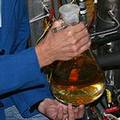生技公司專利技術 突破酒精燃料困境
 不同於以往使用乙醇混合汽油,美國一家生物技術公司及殼牌石油公司聯合表示,他們已共同開發出一項技術,可將植物糖直接轉換成汽油與相關混合產品。他們希望能以此取代化石燃料,並能以高度比例與汽油混合於一般汽車引擎中;如此一來,以後便不需要為新能源而另外開發特殊設備、新型引擎或混油設備了。
不同於以往使用乙醇混合汽油,美國一家生物技術公司及殼牌石油公司聯合表示,他們已共同開發出一項技術,可將植物糖直接轉換成汽油與相關混合產品。他們希望能以此取代化石燃料,並能以高度比例與汽油混合於一般汽車引擎中;如此一來,以後便不需要為新能源而另外開發特殊設備、新型引擎或混油設備了。
這項由威斯康辛州麥迪遜「維仁特能源系統公司」(Virent Energy Systems)首推的「生質能源轉化系統」(BioForming),目前已申請專利。該技術其實就如煉油廠一般,但卻是利用「植物糖」轉化為碳氫化合物分子,再轉製成汽油、柴油及飛機燃料等碳氫化合物燃料及相關產品。
「目前面生質燃料臨的問題是技術無法廣泛應用,雖然已有人著手改良燃料配置設備及汽機車引擎,但若能像維仁特能源系統等公司,研發出和汽油及柴油相似,甚至更優良的新燃料,那真是非常令人興奮的事。」 殼牌石油公司未來燃料暨二氧化碳部執行副總史溫尼(Graeme Sweeney)如此表示。
傳統上,酒精燃料是糖經過發酵蒸餾而成,來源有玉米稈、柳枝稷(switchgrass)、小麥梗及甘蔗漿等非食用性材料,及像是小麥、玉米及蔗糖等生質燃料的原料。然而,兩公司利用新技術轉化的生質汽油分子,不僅包含了較高的能量,燃料效率也較酒精為佳。此外,他們也指出,生質汽油分子能夠完全溶於汽油,或是混合於含有酒精的汽油中。
截至目前為止,這兩家公司已投入一年時間在研究上,他們表示,科技進步一日千里,在產量、油品配方及成本上都已有重大突破,未來將專注於科技改良,以期能達到大量生產的規模。
A Wisconsin bioscience company and Royal Dutch Shell say they have developed a process to convert plant sugars directly into gasoline and gasoline blend components, rather than ethanol.
The collaboration aims to create new biofuels that can be used at high blend rates in standard gasoline engines in place of fossil fuels. This could potentially eliminate the need for specialized infrastructure, new engine designs and blending equipment.
The patented and trademarked BioForming process pioneered by Virent Energy Systems, Inc. of Madison converts plant sugars into hydrocarbon molecules like those produced at a petroleum refinery. The biomass feedstocks are converted into conventional hydrocarbon fuels and products, including gasoline, diesel, and jet fuel.
"The technical properties of today's biofuels pose some challenges to widespread adoption," said Dr. Graeme Sweeney, Shell executive vice president Future Fuels and C02. "Fuel distribution infrastructure and vehicle engines are being modified to cope but new fuels on the horizon, such as Virent's, with characteristics similar or even superior to gasoline and diesel, are very exciting."
Traditionally, sugars have been fermented into ethanol and distilled. These new "biogasoline" molecules have higher energy content than ethanol or butanol and deliver better fuel efficiency.
"They can be blended seamlessly to make conventional gasoline or combined with gasoline containing ethanol," the companies said Wednesday in a statement.
The sugars can be sourced from non-food sources like corn stover, switchgrass, wheat straw and sugarcane pulp, in addition to conventional biofuel feedstock like wheat, corn and sugarcane.
The companies have so far collaborated for one year on the research. They say the technology has advanced rapidly, exceeding milestones for yield, product composition, and cost.
Future efforts will focus on further improving the technology and scaling it up for larger volume commercial production.






